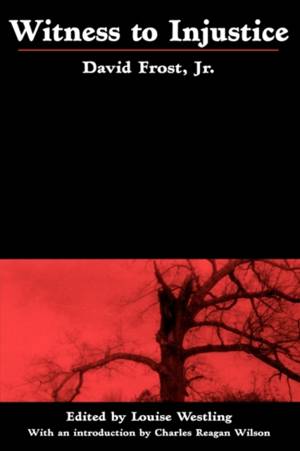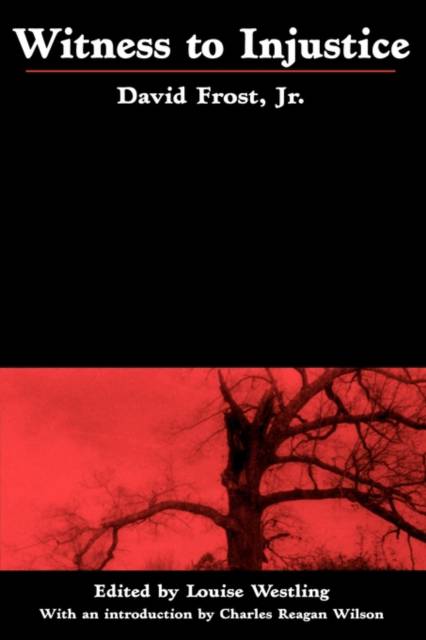
Je cadeautjes zeker op tijd in huis hebben voor de feestdagen? Kom langs in onze winkels en vind het perfecte geschenk!
- Afhalen na 1 uur in een winkel met voorraad
- Gratis thuislevering in België vanaf € 30
- Ruim aanbod met 7 miljoen producten
Je cadeautjes zeker op tijd in huis hebben voor de feestdagen? Kom langs in onze winkels en vind het perfecte geschenk!
- Afhalen na 1 uur in een winkel met voorraad
- Gratis thuislevering in België vanaf € 30
- Ruim aanbod met 7 miljoen producten
Zoeken
Omschrijving
Witness to Injustice by David Frost, Jr. edited by Louise Westling with an introduction by Charles Reagan Wilson There were two events in particular that had a lasting effect on the life of David Frost, Jr. "Watching my parents make moonshine in our back yard in a washpot," he says, "and listening to my parents tell the story of how the Peterson boy was lynched here in Eufaula. My parents would tell it like it had just happened." In this compelling account of his life as an African American in Eufaula, Alabama, Frost illuminates the strange world of the rural South. He was a living witness to both the dramatic racial violence and the heroic struggles of the civil rights movement. This world included lynchings as well as the quieter activities of everyday life. His story, told honestly and earnestly, pictures an alternately violent and placid community where whites not only brutalized blacks but also came to their aid. Frost tells of the intricate web of collusion, cooperation, treachery, competition, and sometimes gleeful gamesmanship that wove together the lives of black and white people in this typical southern community. His story recounts his unique perspective on this complex social culture in which strange twists governed daily life, in which a black moonshiner evading the law might take the white sheriff hunting on his property, a culture in which a white doctor, the leader of a lynch mob, spent the rest of his life trying to atone by serving the medical needs of the black community. Although there are multitudinous analyses, narratives, and reports detailing the baffling enigmas of southern history, in this exceptional memoir a fresh, previously unheard voice reveals cultural complexities that most historians have neglected. David Frost, Jr. (deceased) lived in Eufaula, Alabama. Louise Westling is Professor Emerita of English at the University of Oregon. Charles Reagan Wilson is a professor of history and southern studies at the University of Mississippi.
Specificaties
Betrokkenen
- Auteur(s):
- Uitgeverij:
Inhoud
- Aantal bladzijden:
- 138
- Taal:
- Engels
Eigenschappen
- Productcode (EAN):
- 9781604738865
- Verschijningsdatum:
- 1/10/1995
- Uitvoering:
- Paperback
- Formaat:
- Trade paperback (VS)
- Afmetingen:
- 152 mm x 229 mm
- Gewicht:
- 213 g

Alleen bij Standaard Boekhandel
+ 118 punten op je klantenkaart van Standaard Boekhandel
Beoordelingen
We publiceren alleen reviews die voldoen aan de voorwaarden voor reviews. Bekijk onze voorwaarden voor reviews.









